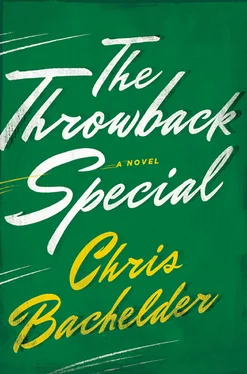The young woman at the front desk was likely not aware of Charles’s memory of the puzzle, though she had grown up with two older brothers. She smiled and nodded at Charles — or at a spot just above his shoulder — as he walked past the desk. “Good morning, sir,” she said. Charles walked outside to verify briefly the wetness and coldness of the rain. He walked back through the automatic doors into the lobby, into the men’s restroom. The restroom was empty and glistening. A stalactiform mass depended from the ceiling, dripping slowly. Charles selected a corner stall beneath a flickering fluorescent light, and he saw at once the work of the diligent vandal. Someone (Carl) had traced his left hand dozens of times. The hands filled the wall. Charles placed his left hand inside the outline of the vandal’s hand. He reached high for another. The effect of the multiplicity of hands was not of many people, but of a single person amplified by trouble. Charles worked with adolescents with eating disorders, and so he knew very well the forms of desperate assertion.
THROUGH THE WINDOWS of the dining area, the hotel parking lot shone darkly in the cold rain. The lights above the lot were on, casting a weak yellow glow in the mist. At the offensive linemen’s table, Gil spoke of the tiny hinges of a dollhouse roof. His Mark May jersey was radiant against the dun breads of breakfast. At a nearby table, the conversation drifted inevitably toward vasectomy and time share. Wesley said they could now cauterize the vas deferens in a scalpel-free procedure. Gary was adamant about an A-frame chalet in the Smokies. Vince heard the men out, nodding, but he said he was just not ready. “Suit yourself,” Gary said, leaving the table for more instant oatmeal.
Later, full, the men pulled their chairs away from their breakfast tables. They had nowhere to be until ten o’clock. They sat, leaned back, crossed their legs at the ankles, at the knees. They drank coffee, picked at pastries. They talked, read complimentary newspapers, played games on phones, took photographs of themselves, stared at the mute television. One man worked a crossword, another put new laces in his cleats, another used the sharp edge of a business card to remove food from his teeth. Another performed a magic trick with a quarter and upside-down cups. George did chair yoga. Like the dog that licks its testicles, they refilled their coffee cups because they could. The coffee was bad, but its poor quality served to strengthen the community. The day was in front of them. The dining area, seen as a whole, appeared to be a site both of great torpor and great vitality, as the sheer variety of indolence manifested as an energetic bustle.
If asked to specify the best part of the weekend, not one of the men would think to name this languorous interlude in the dining area, and yet there was no time better than this. This was the best time, this brief span of Saturday morning. It was not an event, could not be named or considered. Consequently, the men could enjoy it without pressure, anxiety, or self-consciousness. Indeed, without awareness. They could enjoy it without enjoying it. If they were aware of it as a potentially enjoyable event — Post-Breakfast Relaxation, 9:15–10:00, Dining Area — then it would almost certainly cease to be such an enjoyable event. Disappointment was the freight of expectation. Unbeknownst to the men, this was what they came here for, every year. They were enjoying their morning, but they did not realize it. The good moments, it is true, were always this way, interstitial and unacknowledged. They craved occasion, but did not understand it. Halfway through their lives — considerably more than halfway, in several cases — the men knew nothing of their own vast contentment.
A woman entered the dining area with a boy. She paid no attention to the men in their jerseys. She briefly surveyed the continental breakfast. Then she filled two cups with orange juice, and put lids on the cups. She wrapped food in napkins, and began to arrange the food in her large purse. The boy, eight or nine, shuffled away from her, peered into the fruit bowl. He withdrew two apples and an orange. “Don’t touch anything,” his mother said, without looking up from the buffet. The boy turned toward the dining area, and he began to juggle the fruit. The men tapped each other on the shoulders, shifted in their chairs to watch with amusement and anxiety. They knew too well how it would end, the bruised fruit rolling beneath tables, the boy scolded once more. His face glowed with concentration. He had taught himself to juggle in his bedroom, and he was good. He would not drop the fruit. The men began to relax. They began to miss their own children. It was the best kind of missing, without pang or ache. They did not actually want to be with their children. They had fond thoughts, and were grateful for the distance that generated those thoughts. “Let’s go , Brian,” the woman said. “Right now.” She zipped her bulging purse, and walked toward the lobby. As abruptly as he had begun, the boy stopped juggling. He gently caught an apple with a hand that held an apple. He wiped each piece of fruit with a napkin, placed them into the bowl, and then jogged after the woman. “We’re late,” the woman said. Gary, tugging at the neck of his Lawrence Taylor jersey, muttered an unkind word about the woman, and Jeff laughed. The more thoughtful among the men considered the ways in which they, too, may have become inured to the remarkable.
“JUST IMAGINE THAT,” Bald Michael said. “Imagine that you’re seventy-eight years old, living in Florida, reading your military history books, doing physical therapy, minding your own business. And then your daughter shows up with her new boyfriend. She’s so excited for you to meet him. This guy is fifty years old. He walks with a limp. Just imagine that. It’s humiliating for everyone. It’s like putting a sweater on a dog.”
Peter nodded, though at the mention of Florida his mind wandered to his worries about retirement income, and then to his irritation about the rapidly increasing annual dues.
The men were convened again in 324, waiting for film study. On the back of the door Carl had taped a sign-up sheet for optional afternoon haircuts, and a half dozen men clustered there with a dull pencil. Another six or seven men had gathered by the television. There was some trouble connecting the laptop to the television. What was needed, apparently, was an HDMI cable. None of the men had one, but several of the men thought simultaneously of Cyber Jim, the computer maven at Prestige Vista Solutions. According to the schedule posted outside of the conference room, Jim would be in meetings until noon.
Really, any container would have worked just fine. By holding the ends of a damp towel, Trent made a kind of sack, into which he poured all of the ping-pong balls from a green duffel bag. He shook the balls ceremoniously, and the sad and merry sound of their jostling quieted the room. Trent reached into the damp towel, and removed a ball. He squinted to ascertain Randy’s name. There was no way Trent was sending Randy into that conference room. The job required some charisma. “Derek!” Trent shouted, tossing the ball quickly back into the sack.
The men clapped and cheered, chanting the name. Derek was the right guy for this. Those who were close enough to Derek reached out to touch him, slapping him on the back or punching him not forcefully on the arms. Derek was not happy to be chosen. He sat on the edge of a queen bed, jiggling his legs. Not fair, he thought.
“What’s it called again?” he said.
“HDMI cable.”
“And who’s the guy?”
“Cyber Jim. There’s a Khakis Jim, too, but it’s not him.”
“Careful, Derek, though, because Cyber Jim is wearing khakis.”
Читать дальше












